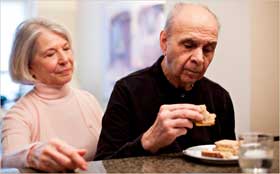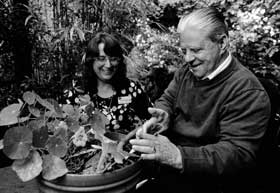The Aging Revolution Event for Seniors – Age Independently, Gracefully, Purposefully
Event will be held November 7, 2010 from 1-3:30 p.m. at the West Vancouver Seniors Center and is open to the public, free of charge
Carolina and Jay Orosa of Home Care Assistance, a leading provider of non-medical in-home care for seniors, are producing and hosting the first ever, Aging Revolution Event on Sunday, November 7th, at the West Vancouver Seniors Center from 1-3:30 p.m. This inaugural event is open to the public, free of charge, and will offer valuable information, resources and presentations for seniors and adult children on aging well, increasing quality of life and longevity, lifestyle choices and activities, eldercare planning, etc.
“We are very excited to be hosting this event because we believe that there needs to be a paradigm shift in the way society views aging,” said Carolina Orosa, Co-Owner of Home Care Assistance. “We see this event as being the forum to jumpstart that shift and enlighten seniors and their adult children about how to age with grace and purpose. We also want them to be aware of the various resources in the community that are available to help them plan for the future, maximize their independence and sustain a high quality of life.”
The Aging Revolution Event will include the following:
- Fifteen plus booths featuring various community resources catering to seniors
- Presentations by senior care industry leaders which will inform and inspire all who attend
- Complimentary tea and sweets
- Prizes from participating companies
The industry leads that will speak at the event are:
Stay Fit to Stay Vertical – Angela Sealy, Coordinator. Active Choice Program (UVIC). Her background as a Psychologist and extensive experience facilitating groups helps her successfully encourage physical activities through conscious choice.
The 3 D’s of Parents Every Adult Child Should Know – Peter Silin, MSW, RSW, Principal, Diamond Geriatrics. He has worked with seniors over 30 years on various issues and provides services such as eldercare consulting, counselling, and case management.
Brain Gain – Creative & Intellectual Activities – Yoying Orosa, RSW, Therapeutic Program Director, George Derby Centre. She is a music therapist and social worker with over 25 years of exploring the use of music and the creative arts to stimulate the physical, emotional, cognitive and spiritual well-being of seniors.
Ed Kry, Chair, Elder College Program, Capilano University. Aside from being committed to continuing education for seniors, he is also a very active member of the community, serving as the Chair of the North Shore Cardiac Rehabilitation Society.
Happy to 102, An Inspirational Story on Aging Well – Olga Kotelko, holds multiple track and field world records. She is a 91 year old athlete who competes to this day and is a living example of how to age with purpose.
For more information about Greater Vancouver Home Care Assistance please visit: www.homecareassistance.com or call us at 778-279-3634.
The Aging Revolution Event is sponsored by: Park Royal Shopping Centre, North Shore News, Hollyburn House and produced by Home Care Assistance and Christine Monaghan.

 Who said art was strictly for artists? A new program that encourages active participation in the arts from the elderly is growing in popularity because of marked improvements in the participants’ physical and emotional well-being.
Who said art was strictly for artists? A new program that encourages active participation in the arts from the elderly is growing in popularity because of marked improvements in the participants’ physical and emotional well-being.





